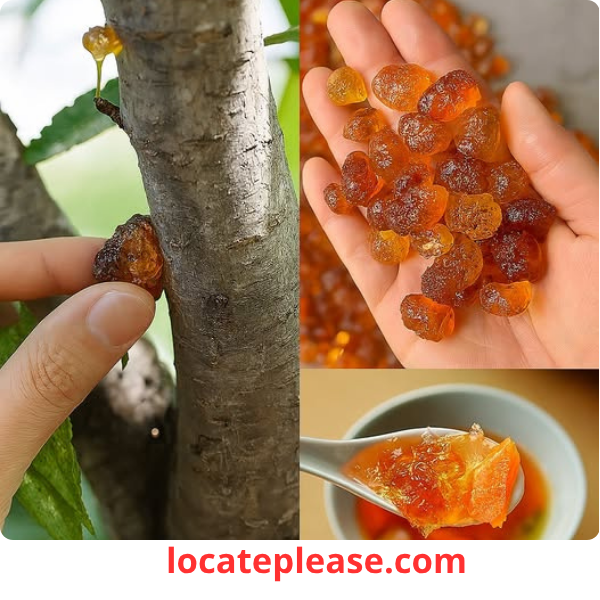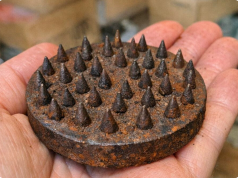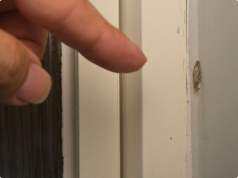Tucked among the branches of peach trees, a quiet miracle forms: golden, amber-like droplets that harden in the sun. Most people pass by without noticing — but this natural substance, known as peach tree resin, is far more than a botanical oddity.
It’s extremely durable, used in fine art, luxury varnishes, and eco-friendly products — and yes, it can be very expensive due to its rarity and labor-intensive harvesting.
But what most people still don’t realize?
👉 This natural resin also holds powerful, time-tested health benefits.
While modern medicine often overlooks plant-based remedies, traditional healing systems have valued tree resins for centuries — and science is now catching up.
Let’s explore why peach tree resin is so valuable — and how it can support your health naturally.
What Is Peach Tree Resin?
Peach tree resin is a natural exudate — a protective sap that oozes from the bark when the tree is injured by pruning, insects, or weather stress. Over time, it hardens into crystalline, glass-like droplets that cling to the trunk and branches.
These golden gems may look like tree “scars,” but they’re actually nature’s healing response — and they carry healing power for humans too.
Why Is It So Expensive?
- Rare & slow to produce – Only small amounts form per tree
- Hand-harvested with care – Must be collected without damaging the tree
- Highly stable & resistant – Water-, heat-, and chemical-resistant once dried
- Used in luxury industries – From violin varnishes to natural cosmetics
- Sustainable & biodegradable – A green alternative to synthetic resins
These qualities make high-quality natural tree resins prized in niche markets — often selling for hundreds of dollars per kilogram.
Health Benefits of Peach Tree Resin (Backed by Tradition & Science)
While research on peach-specific resin is still emerging, studies on related plant resins (like cherry, plum, and other Prunus species) — along with centuries of traditional use — reveal powerful therapeutic properties.
🌿 1. Natural Antimicrobial & Antiseptic
Peach tree resin contains polyphenols and flavonoids that help fight bacteria, fungi, and viruses.
✅ Traditional use: Applied topically to:
- Clean minor cuts and scrapes
- Prevent infection
- Speed up wound healing
Modern studies on similar tree resins show effectiveness against Staphylococcus and E. coli.
🌿 2. Anti-Inflammatory & Pain-Relieving
The resin has natural anti-inflammatory compounds that can help reduce swelling and discomfort.
✅ How it’s used:
- Chewed in small amounts (in traditional medicine) for sore throats
- Applied as a poultice for joint pain or muscle aches
- Used in herbal tinctures for internal inflammation
🌿 3. Soothes Digestive Issues
In Middle Eastern and Central Asian folk medicine, small pieces of dried tree resin are dissolved in warm water or milk to help with:
- Gastritis
- Ulcers
- Diarrhea
- Irritable bowel symptoms
Its mucilage-like texture coats the digestive tract, soothing irritation — similar to how modern demulcent herbs (like marshmallow root) work.
🌿 4. Supports Oral Health
Due to its antimicrobial and astringent properties, peach resin has been used to:
- Reduce gum inflammation
- Relieve toothaches
- Freshen breath
Some traditional practices involve chewing a small piece like natural gum to clean teeth and strengthen gums.
🌿 5. Rich in Antioxidants
Like many plant resins, peach resin contains natural antioxidants that help neutralize free radicals — reducing oxidative stress linked to aging and chronic disease.
This makes it a potential ally in boosting immune function and protecting cells.
How to Use Peach Tree Resin Safely
⚠️ Important: Always ensure the resin is clean, pesticide-free, and properly identified. Never harvest from trees in polluted areas or treated with chemicals.
✅ Topical Use (for skin & wounds)
- Clean the resin with distilled water.
- Crush into a fine powder.
- Mix with a carrier oil (like coconut or olive oil) to form a salve.
- Apply to minor cuts, burns, or irritated skin.
✅ Oral Use (with caution)
- Dissolve a small pea-sized piece in warm water or milk.
- Drink slowly to soothe sore throat or upset stomach.
- Do not swallow large pieces — they are not digestible.
🚫 Not recommended for children, pregnant women, or those with allergies without consulting a healthcare provider.
Other Trees With Similar Healing Resins
Peach isn’t alone. Other stone fruit trees produce resins with comparable benefits:
- Cherry – Used for respiratory health
- Plum – Traditionally used for digestive balance
- Apricot – Valued in Ayurveda and TCM (Traditional Chinese Medicine)
These resins are part of a broader tradition of plant-based healing that honors nature’s pharmacy.
Final Thoughts: A Hidden Gift from the Tree
Peach tree resin is more than a curiosity — it’s a rare, resilient, and remarkably useful gift from nature.
Its high price reflects not just its durability and rarity, but its deep connection to natural wellness.
From protecting fine instruments to soothing sore throats, this humble golden drop bridges the worlds of craftsmanship and healing.
So next time you see those shiny beads on a peach tree, remember:
They’re not just sap.
They’re nature’s liquid gold — healing the tree… and maybe one day, helping to heal you.
🌿💎
Sometimes, the most powerful medicine doesn’t come from a bottle — it drips from a branch.






